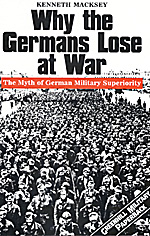
Greenhill Books, 240 pages, 1996, ISBN 1-85367-383-8, trade paperback
Originally titled From Triumph to Disaster, this trade paperback Why the Germans Lose at War examines the "myth of German Military Superiority" in the 20th Century.
Starting in earnest with Frederick the Great and the 7 Years War, and ending in 1945 at the end of WWII, Macksey weaves a premise that the Germans suffered from an ultimately fatal arrogance of their own capabilities and stretched themselves too far and too fast.
Macksey contends the root of such aggressiveness traces to the 1410 Battle of Grunwald, where the Knights of the Teutonic Order met disaster. From there, he fast forwards to Frederick the Great and his efforts at unification -- and only the untimely death of the Russian Empress (and with Russia dropping out of the 7 Years War) saved Prussia from dismemberment from a superior Allied force.
Napoleon then demolishes the Prussians at Jena/Auerstadt in 1806, and Prussia adapts quickly to join the Allies and crush the French in 1813-1815. It's at that time the "modern" General Staff system flourishes, bringing national destiny into the hands of a politico-military elite. Wars of 1860-1871 unify Germany and give rise to overconfidence that they can master Europe. Disaster in 1918 is the result, and the rise of Hitler and eventual defeat in 1945 a second lesson in greediness.
Macksey supports his thesis with examples of profoundly poor decision making by an increasingly cowed military establishment. At the tactical level, competence reigned, but from an operational and strategic viewpoint, the vaunted General Staff succumbed to changing and/or split priorities which ripped their strength and played into their opponents' strengths.
The war against the Soviet Union, against the background of the pre-Barbarossa thrust into Yugoslavia and Greece, grabs a good portion of the book, for it is here that the German Army and Air Force grinds to a halt and then is tumbled backwards. Macksey lays bare the inner workings of the General Staff and its relation with Hitler, and provides the insight into some of the more spectacular blunders such as Stalingrad, Kursk, and others.
Of import is the Allied cracking of German codes. Ironically, it was German's build up of sophisticated communication systems that caused orders to flow to and from HQ -- and into Allied hands.
- "With supreme confidence in the technology at their disposal, it seemed incomprehensible that anyone else could devise a method by which Enigma's enormous number of key-settling combinations could be broken quickly and in sufficient quantity to make the operation a threat to its security. Thus, the Germans again fatally committed the military sin of despising their enemy." (pg. 183).
In trying to explain failure, Macksey tends to discount successes, such as the Rhineland, Austria, and Czechoslovakia -- most of which the General Staff opposed. And in these successes, Hitler's control over the General Staff and thus the German military strengthened, making it increasingly difficult to "just say no" as the Fuhrer increasingly meddled with strategic military campaigns and operational objectives. As the ideological rift deepened between career generals and Nazi appointees -- not so much over the "final solution" as dictatorial meddling -- the quality of decision-making declined. The German armed forces were stopped, pushed back, and ultimately defeated.
Why the Germans Lose at War is a quick read, with effective prose, and a nice display of information timing. If the overall premise of German arrogance remains a bit too simplistic, the detailed analysis of intelligence failures, inconsistent and all too short-term planning, and high-level political jockeying presents excellent insight into the flawed brilliance of German command practices.
Info: Greenhill:
E-mail for more information
www.greenhillbooks.com
Back to List of Book Reviews: World War II
Back to Master List of Book Reviews
Back to Master Magazine List
© Copyright 1997 by Coalition Web, Inc.
This article appears in MagWeb (Magazine Web) on the Internet World Wide Web.
Other military history articles and gaming articles are available at http://www.magweb.com